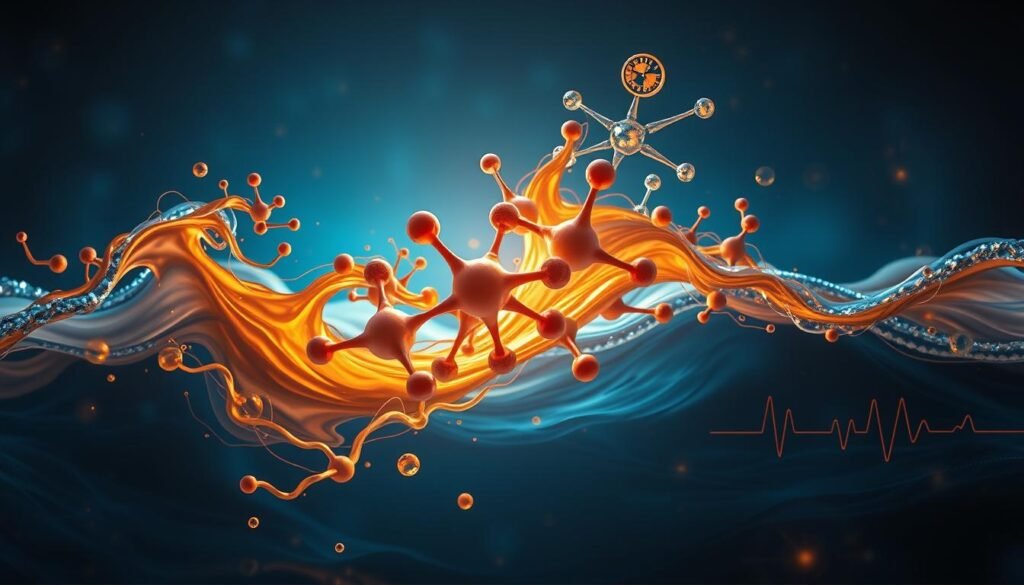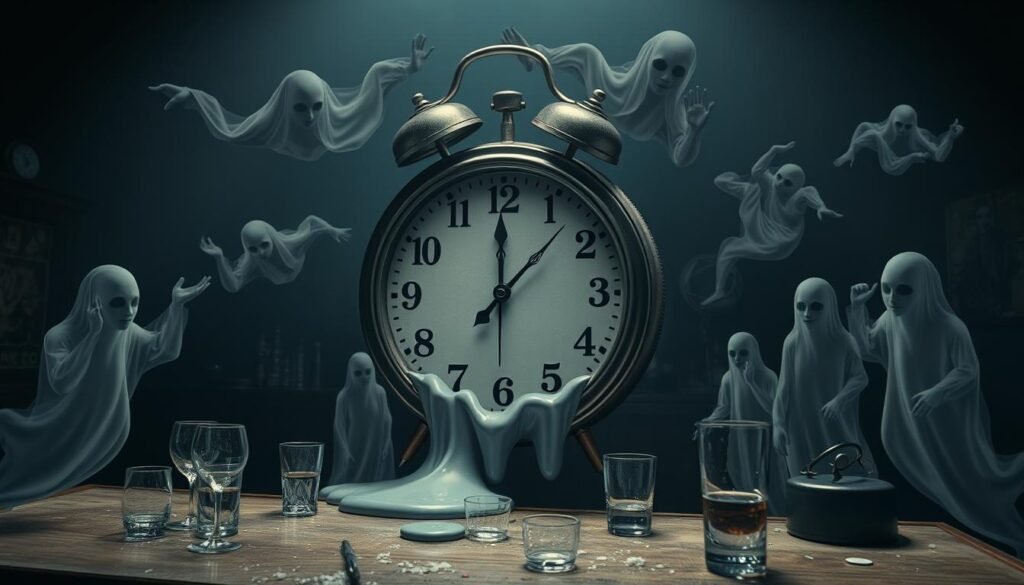Research shows that about 12% of people with a hangover feel anxious afterwards. This condition, often called hangxiety, links alcohol use to emotional problems. After drinking, people might feel more anxious and depressed the next day. These feelings can include regret, worry, and stress, which affect daily life and happiness.
Hangxiety is more than just a temporary feeling. It happens because of how alcohol changes brain chemistry. This affects neurotransmitters and hormones, making anxiety likely to stay even when no alcohol is present. Learning about the effects of drinking on anxiety can help explain why recovery is hard for many. For more on hangxiety, click here.
Key Takeaways
- Hangxiety affects roughly 12% of those who have a hangover.
- Alcohol consumption can elevate cortisol levels, leading to increased anxiety.
- Hangxiety can trigger feelings of regret and nervousness.
- Managing hangover anxiety involves hydration and other self-care strategies.
- The connection between alcohol and anxiety is often cyclical and harmful.
- Some individuals may consider quitting alcohol due to severe hangxiety symptoms.
- Understanding hangover anxiety is crucial for better mental health management.
Understanding Hangover Anxiety
Hangover anxiety, or “hangxiety,” includes uncomfortable feelings after drinking. It shows up differently for everyone. Recognizing its variations is key.
Definition of Hangxiety
Hangxiety describes the anxiety after drinking. You might feel dread or unease. It varies in strength based on drinking habits and emotional health.
Common Symptoms of Hangover Anxiety
It’s important to know the symptoms of hangover anxiety. People often notice:
- Rapid heartbeat
- Irritability
- Feelings of guilt or regret
- Tendency to ruminate over previous night’s behavior
- Heightened sensitivity to stress
These feelings can outshine usual hangover symptoms, like headaches. It leads to social anxiety and worry about last night’s actions. Knowing the difference helps manage it and reassess drinking habits.
The Physiology of Alcohol and Anxiety
Alcohol has a big impact on the brain’s neurotransmitter systems. This leads to a mix of effects that can cause anxiety when you drink. At first, alcohol makes you feel relaxed and calm. It does this by boosting GABA, a neurotransmitter that helps you chill out. This can seem like a quick fix if you’re feeling anxious.
Effects of Alcohol on Neurotransmitters
When your body starts to process alcohol, things begin to shift. GABA levels go up, making you relaxed, while glutamate, which keeps you alert, goes down. This feels easing for a bit. But, if you stop drinking, the calm fades, and anxiety kicks in. GABA dips and glutamate rises, making you more anxious.
The Role of GABA and Glutamate
The dance between GABA and glutamate explains why hangovers can feel anxious. Less GABA and more glutamate means you might feel edgy, irritable, and worried. If you drink a lot, often, your body gets used to it. This messes with your nervous system and can make anxiety worse, even without alcohol.

| Neurotransmitter | Effect Before Alcohol Processing | Effect After Alcohol Processing |
|---|---|---|
| GABA | Increases relaxation | Decreases, leading to anxiety |
| Glutamate | Promotes alertness | Increases, contributing to heightened anxiety |
Using alcohol to deal with anxiety can trap you in a cycle. This way of coping might make you depend more on alcohol. It can make your anxiety worse over time. It can even lead to an alcohol use disorder. Knowing how alcohol affects neurotransmitters is key to understanding its impact on mental health.
Cortisol and Stress Levels After Drinking
Discovering how drinking affects our stress and anxiety is key. Alcohol influences our mental health in many ways. It’s about how the body reacts to stress. Drinking might make you feel calm at first by lowering cortisol. But, drinking a lot over time can make cortisol levels go up.
Connection Between Alcohol Consumption and Cortisol
Studies show drinking too much can make cortisol levels rise. This can lead to health problems like high blood pressure. Drinking often or too much can mess up how your body handles cortisol. This can cause more stress and anxiety. Drinking too much for a while is risky. It shows why using alcohol to deal with stress is not good.
Gender Differences in Cortisol Response
How men and women handle stress from alcohol can be different. Women may see their cortisol levels jump higher than men. This means they might feel more anxious after drinking. Knowing these gender differences in anxiety is crucial. Tailoring treatment for alcohol anxiety might need to consider these differences.

How Long Does Hangover Anxiety Last?
Knowing how long hangover anxiety lasts helps us control it better. Usually, hangxiety is worst the day after you drink. It causes emotional and physical reactions. Although hangover anxiety often lasts about 24 hours, some factors can extend this time.
Typical Duration of Hangxiety Symptoms
For some people, the anxiety after drinking lasts only a few hours. However, for those with anxiety disorders, it may take longer. The symptoms can go beyond the hangover, impacting mood and health. Frequent drinkers might experience longer anxiety periods, sometimes more than a day.
Factors Affecting Duration
Several important factors influence hangxiety length. These factors include:
- Amount of Alcohol Consumed: Drinking more can make anxiety worse and last longer.
- Body Size and Composition: How your body processes alcohol affects anxiety length and severity.
- Liver Health: A healthy liver means quicker recovery from hangover symptoms.
- Mental Health Background: People with anxiety issues may have longer hangxiety periods.
- Social Context: Where you drink can affect how long anxiety lasts.

In short, various factors impact hangover anxiety duration. But, you can reduce or avoid long-lasting symptoms with the right measures.
Anxiety After Drinking Alcohol: Chemical Changes in the Brain
Alcohol affects our brains deeply, leading to chemical changes after drinking. These changes can greatly increase anxiety, especially when we stop drinking.
How Alcohol Impacts Brain Chemistry
Alcohol mainly acts as a depressant, changing neurotransmitter levels like GABA and glutamate. At first, it raises GABA, making us feel calm. However, this calm goes away as we stop drinking. This leads to reduced GABA and more glutamate, causing anxiety. As the body tries to find balance, alcohol withdrawal anxiety kicks in. People may feel restless and highly anxious, especially after heavy drinking periods.
Withdrawal Effects from Alcohol
Stopping alcohol leads to several symptoms due to brain chemistry changes. Anxiety is common, but there’s also a rise in noradrenaline. This hormone increases our stress response, making withdrawal harder. Studies show that long-term heavy drinking can affect our brain for a long time. It highlights the struggle of reducing alcohol intake. Knowing these effects is key to tackling hangxiety and other issues.
Psychological Factors Contributing to Hangxiety
Hangover anxiety, or “hangxiety,” includes several psychological elements. Feelings of drinking remorse often come up after drinking. Spiraling thoughts may follow, increasing anxiety.
People worry about their behavior at social events. They ponder how others saw them or the decisions they made. This worry amplifies their anxiety triggers.
Regret and Worry After Drinking
Regret and concern often hit after nights of heavy drinking. These feelings can lead to negative thinking. This makes it hard to sleep or go about daily life.
Studies say anxiety is more common with frequent heavy drinking. This is especially true for young adults prone to anxiety disorders. The habit of self-reflection brings more dread and discomfort, making it tough to forget last night.
Influence of Expectations
Expectations about drinking can shape post-drinking experiences. While many hope for relaxation and fun, they might feel anxious instead. This influence of expectations causes confusion and more distress when results are unexpected.
People in this situation often find it hard to make sense of their feelings. Understanding the psychological aspects can help manage post-drinking anxiety. It highlights the importance of being mentally strong and mindful when drinking.
Heavy Drinking and Anxiety Risks
Understanding the risks of heavy drinking sheds light on its profound impact on mental health. It can drastically change the way our brain works. People who often drink too much are more likely to have anxiety disorders. This creates a hard-to-break cycle of drinking and anxiety.
Impact of Frequent Alcohol Use on Mental Health
Drinking too much alcohol messes with our brain’s chemicals, especially GABA. GABA helps control our nervous system. Alcohol increases cortisol, which can make us feel anxious or restless. Around 30% of people with a drinking problem also struggle with their mental health.
Feeling anxious or having “hangxiety” after drinking doesn’t always mean you’re dependent on alcohol. But if it happens a lot, it might be a sign of a bigger issue.
Predisposition to Anxiety Disorders
There’s a clear link between heavy drinking and anxiety disorders. Many people drink to handle stress, with 1 in 5 saying it helps them cope. However, this can actually make anxiety worse over time. Studies have found that 20% of people with an alcohol issue also have an anxiety or mood disorder.
Increased drinking can lead to stronger panic attacks. It’s key to know your limits. Seeking help that focuses on both alcohol and anxiety can really help in recovery.
| Impact of Heavy Drinking | Typical Mental Health Implications |
|---|---|
| Disrupted neurotransmitter function | Increased anxiety symptoms |
| Elevated cortisol levels | Restlessness and panic attacks |
| Co-occurring disorders | Heightened risk of long-term mental health issues |
| Used as a coping mechanism | Potential exacerbation of anxiety conditions |
If you often feel anxious, talking to a professional can help. They can give you a proper diagnosis and a plan for treatment. Knowing how alcohol affects anxiety can help you make better choices for your mental health.
For more details on this complex interaction, visit here.
Prevention Strategies for Hangover Anxiety
Understanding how to drink in moderation and stay hydrated is key. By following a few simple steps, people can manage how much they drink. This helps reduce hangover discomfort.
Moderating Alcohol Intake
It’s important to set personal drinking limits. You might choose only certain days to drink. Eating a good meal before drinking can lessen hangover effects and anxiety. Drinking a non-alcoholic beverage after each alcoholic one helps control your intake and keeps you hydrated.
Hydration and Nutrition Tips
Staying hydrated is crucial to avoid hangover anxiety. Drink water or non-alcoholic drinks all night to prevent dehydration. This can lower next-day anxiety. Try sipping water between alcoholic drinks and eat water-rich foods. For more tips on reducing hangover anxiety, check out this article.
| Strategy | Description |
|---|---|
| Eat Before Drinking | Consuming a meal helps slow alcohol absorption, mitigating hangover symptoms. |
| Set Personal Limits | Establishing a maximum number of drinks each time reduces negative outcomes. |
| Alternate Drinks | Alternating between alcoholic and non-alcoholic beverages aids in maintaining hydration. |
| Stay Hydrated | Drinking water and hydrating foods throughout can alleviate anxiety post-drinking. |
Using these strategies can really help prevent hangover anxiety. It makes social events more fun without added stress.
Treatment Options for Hangover Anxiety
Dealing with hangover anxiety can be easier with some self-care steps. Things like drinking water, eating healthily, and trying mindfulness can really help. Going for a short walk can also make you feel less stressed. These methods let you care for your health on your terms.
Self-Care Techniques to Alleviate Symptoms
Adding calming teas like chamomile or valerian root to your self-care can be soothing. It’s also vital to sleep well and stay hydrated to fight off headaches and dizziness. Limiting alcohol and finding other fun activities are key to avoiding severe hangover anxiety.
When to Seek Professional Help
If hangover anxiety doesn’t improve, getting professional advice is important. Healthcare pros can design treatment plans for ongoing anxiety or related issues. There’s lots of support out there, like the Alcohol and Other Drug Hotline. Wondering about your mental health? Try taking an assessment. Visit self-assessment resources for a good first step towards support and clarity.